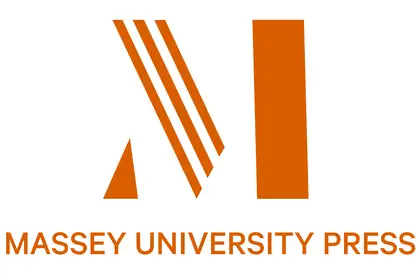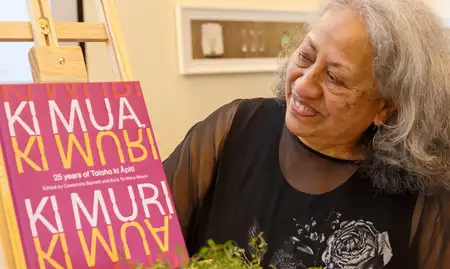
Te Kunenga ki Pūrehuroa Massey University has a vibrant and dynamic publishing arm thanks to highly respected Publisher Nicola Legat ONZM. In 2015, she had left her job as publishing director at Random House New Zealand and heard through the grapevine that the university might be thinking of starting its own press.
The university’s entrepreneurial and applied-knowledge approach was something Ms Legat admired, and the idea of being at the helm of creating the university’s press from scratch particularly interested her. So, she emailed Steve Maharey, the Vice-Chancellor at the time, to find out more, applied for the job and got it.
Once she accepted the role, Ms Legat had the mammoth task of building Massey University Press up from scratch.
“I had to fulfil roles that were performed by other colleagues in other departments at a big multi-national company. I was the publishing director at Random House and while I obviously understood those roles, I’d never had to know the day to day specifics of shipping, royalty payments, marketing, warehousing and so on. It was a steep learning curve!”

Nicola Legat.
One of the key milestones in the early days was the creation of a standalone ecommerce website. When funding was secured for that and the website went live, Nicola says it was of enormous benefit to the business and it has continued to be a strong income source.
Within a year she had a part-time project manager working with her on the books. The Press quickly grew to publishing 10 books a year by the end of 2017. Today, Massey University Press publishes about 20 books a year and Ms Legat manages a full-time team of three and a part-time finance manager. The Press, which sits in the Provost’s portfolio, also utilises freelancers for editing, proofreading and design, who are contracted on a book-by-book basis.
The award-winning books Massey University Press issues are incredibly high-quality publications covering a wide range of genres including history, design, art, natural history, architecture, biography and memoir, veterinary science and social issues. They also produce a number of accessibly priced textbooks tailormade for courses across Massey Business School, the College of Science and the College of Humanities and Social Sciences.
The Press’s overarching aim is to publish intelligent, relevant books for inquiring readers and they are buoyed by the whakataukī Mā Aotearoa mō Aotearoa – For Aotearoa about Aotearoa.
How a book comes to life
While anyone can submit a manuscript for consideration, this is not normally the way books develop. It is more often through conversations Nicola has with authors or a result of her contacting an author with a particular field of expertise. Books don’t turn up as fully evolved manuscripts, Ms Legat says. Rather, they are ‘germs’ of ideas that she works with authors on.
When Ms Legat decides she’s interested in publishing a book, the first thing she does is cost it. She will then write an acquisition proposal for the Press’s Editorial Board that sets out why she thinks the Press should publish it and that shows that it is financially viable.
Massey University Press has an advisory committee, the Editorial Board, which is comprised of Professor Anna Brown from Toi Rauwhārangi College of Creative Arts (chair); Head of the School of Humanities, Media and Creative Communication Professor Kerry Taylor; Darryn Joseph, former Associate Professor from Te Pūtahi-a-Toi School of Māori Knowledge, now an independent writer; Professor Jodie Hunter from the Institute of Education; and Kevin Chapman, the former Managing Director of Hachette New Zealand, who runs Upstart Press. Kevin is a senior figure in the New Zealand publishing industry and provides the Board with an all-important external view of the market.
Once approval has been granted, the task of turning a proposal into a book begins. It’s a long process, but one that Ms Legat finds enormously fulfilling.
“It’s a huge job but it’s very creative. Book publishing is a place where creativity meets the commercial world and it’s intellectually very stimulating. I’m going in and out of peoples’ fields of interests and their specialties and helping them make terrific books to explain what it is they do.”
She likens her role to that of a midwife; helping an author extract a book from their brain and get it out into the world.
Outside of her role with the Press, Ms Legat keeps up to date with the goings-on in the publishing world through her role as Chair of the New Zealand Book Awards Trust and as a member of the board of the Auckland Writers’ Festival.
The importance of the Press for the university’s research outcomes
Since the inception of the Press, around half of the published books have come from Massey staff, particularly those in the humanities. Ms Legat says this is due, in part, to other areas of the university being more journal focused for Performance-Based Research Fund (PBRF) purposes.
“The books that we’ve been able to publish for staff in the humanities have been incredibly important to them. For them, there are also fewer outlets for publishing. If you’re a New Zealand historian, for example, there are only two or three academic journals to be published in, but a book is a very meaningful and significant thing and our publicity work ensures that it reaches a wider audience.”
Ms Legat understands that it’s difficult to join the dots and establish a causal link between what the Press publishes and specific research outcomes, such as those measured by the PBRF. However, she says the link absolutely exists if books are regarded as a way of advancing research and consolidating research knowledge and findings. In many respects, the Press is not a business, and exists as a research dissemination and amplification tool, as well as a way to enhance a university’s standing.
Many of the world’s best universities have presses and there is no doubt that the various awards that books by Massey University Press have won, and the media coverage that new books garner, play a significant part in elevating the profile and reputation of the university.
“We work hard to keep the Massey brand vital and well respected,” Ms Legat says.
The future for Massey University Press
Not long after the Press began, Ms Legat realised the need for another funding stream to underpin its viability. So she tendered to take on the publishing for Te Papa Press, the publishing arm of the Museum of New Zealand Te Papa Tongarewa. The successful bid meant that the supplementary income from delivering publishing services to the museum enabled Massey University Press to be financially sustainable. This arrangement has run for nine years, and has recently come to an end. Ms Legat says she’s now free to spend more time on Massey University Press and is relishing that focus.
Almost all of the books offered by the Press are available internationally, with many also sold as ebooks. Ms Legat says there are endless opportunities for the Press, including stepping into the world of audiobooks, which is on the very near horizon.
Read more about the Massey University Press here.
Related news
Beyond the bite: The adventures of a Kiwi vet
In his new memoir The Ones That Bit Me! , veterinarian and alumnus Marcus Taylor recounts the highs and lows of his adventures in the veterinary profession with humour and honesty, offering an exploration of the profound connections between people and animals.

Caldwell uncovered: Remembering the legacy of a New Zealand hero
Historian Dr Adam Claasen explores the extraordinary life of one of New Zealand’s great military heroes, First World War fighter ace Keith Caldwell, in his forthcoming book Grid.

'Ki Mua, Ki Muri' a new book charting the path of Toioho ki Āpiti
'Ki Mua, Ki Muri' examines the last 25 years of the influential programme that sought to revitalise what it means to be Māori in modern-day Aotearoa. As penned by the forewords of artist Nigel Borell, “Toioho ki Āpiti has led the quiet revolution in Māori art.”
